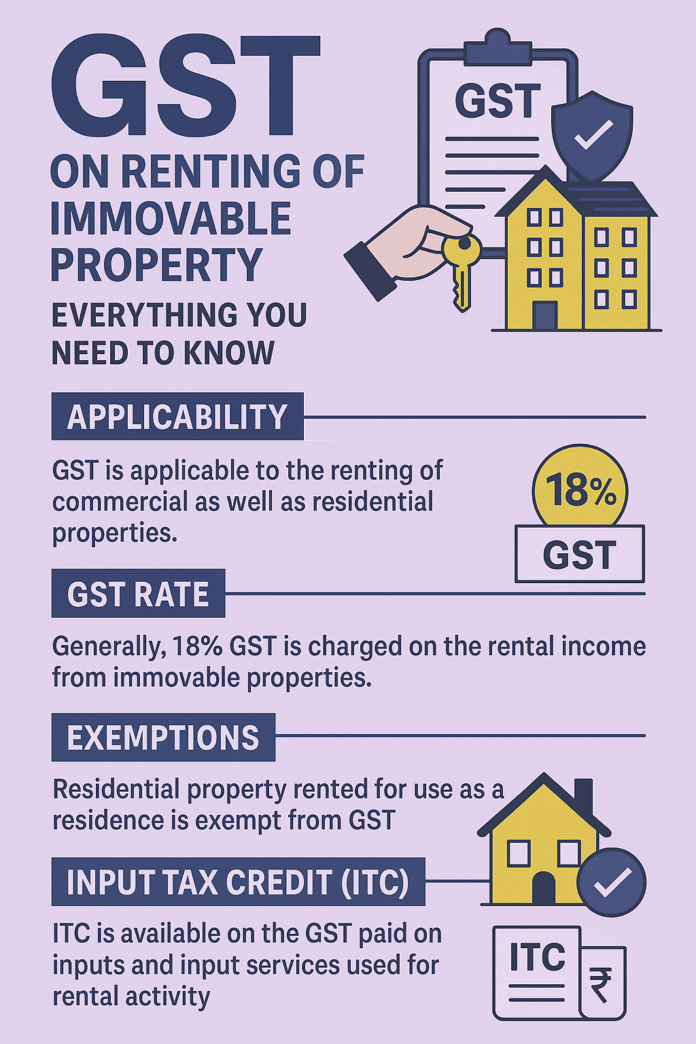Nature of Supply under GST
As per Section 7 of the CGST Act, 2017, renting immovable property is classified as a supply of services. This classification applies whether you’re leasing commercial spaces or residential premises. Commercial property rentals typically attract an 18% GST rate, while residential property may be exempt or taxable based on its use.
GST on Residential Property Rentals
Residential properties rented purely for residential purposes are fully exempt from GST. However, the GST scenario changes if a residential property is rented for business use. For a registered tenant using the residential property commercially, GST at 18% is payable under the Reverse Charge Mechanism (RCM), making the tenant responsible for the GST payment.
GST on Commercial Property Rentals
Commercial properties—such as offices, shops, factories, or warehouses—attract GST at a standard rate of 18%. In most cases, the landlord (if registered) collects and remits GST to the government under the Forward Charge Mechanism (FCM). If the landlord is unregistered, but the tenant is a registered entity, the tenant pays GST under RCM.
Important GST Exemptions
Several key exemptions help alleviate GST burdens. Notably, residential properties rented for personal residential use, agricultural lands rented for farming purposes, and properties rented by charitable or religious trusts (used for exempt activities like education, healthcare, or religious purposes) are all exempt from GST.
Input Tax Credit (ITC) Eligibility
Both landlords and tenants may be eligible to claim Input Tax Credit (ITC) under specific circumstances:
– Landlords: Landlords can claim ITC on GST paid for expenses related to commercial properties, like repairs and maintenance, provided the property is used for taxable supplies. However, no ITC is available for properties rented out for exempt purposes, such as residential use.
– Tenants: Registered tenants renting commercial properties can claim ITC on the GST paid on rental expenses if the premises are used in furtherance of their business. Under RCM, tenants paying GST on residential property used for business purposes can also claim ITC.
Place of Supply and GST Implications
The place of supply for renting immovable property is the property’s actual location, as specified under Section 12(3) of the IGST Act, 2017. This determines whether you charge IGST (interstate) or CGST and SGST (intrastate). For instance, if a landlord is registered in Delhi and rents property in Haryana, IGST applies.
GST Registration for Landlords
Landlords must register under GST if their aggregate rental income crosses ₹20 lakh annually (₹10 lakh for special category states). Upon crossing this threshold, they must collect and remit GST for taxable rentals, notably commercial leases.
GST on Security Deposits
Security deposits collected from tenants are generally not taxable under GST, provided they’re refundable. However, if a security deposit is adjusted against rental payments or property damage, the adjusted portion is considered taxable under GST.
Recent Developments in GST
A significant ruling by the Supreme Court on October 3, 2024, clarified that Input Tax Credit could be claimed on construction expenses for buildings intended for commercial rental activities. This landmark decision eases the working capital for businesses significantly involved in leasing commercial spaces.
Conclusion
Understanding the nuances of GST on renting immovable property ensures compliance and maximizes benefits from applicable exemptions and Input Tax Credit provisions. Whether you’re a landlord or a tenant, staying updated with GST norms is crucial. For expert assistance and consultation, connect with our professionals at TaxMark.
For more information or personalized consultation on GST and taxation matters, visit our website or reach out directly to TaxMark experts.



